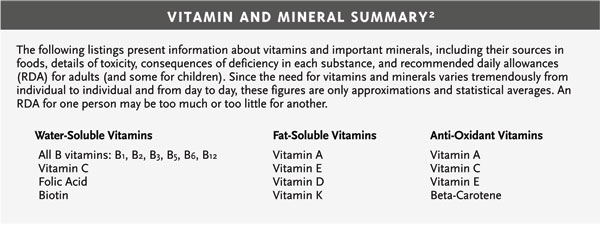Vitamins and Minerals
Our concern about vitamins and minerals is relatively recent in human history, and new discoveries are being made all the time. If we lived more in harmony with the earth and sea, the foods we'd eat would probably supply us with all the vitamins and minerals necessary for good healthy bodies. But since we have robbed our soils of these nutrients, polluted our waters, and overprocessed our food, we must compensate for the empty calories, missing nutrients, and toxic residues of most commercial foods.
Many people therefore have learned to supplement their diets in other ways - through buying so-called vitamin-enriched" foods, or by taking vitamins and minerals in tablet form. Paradoxically, many people prefer to eat polished (white) rice instead of brown rice, then buy bottles of B vitamins that are made from the parts removed from brown rice in the processing! You need vitamins and minerals so that your body can properly regulate its metabolic processes. In and of themselves, vitamins and minerals are not sources of energy, but they do determine and direct the ways in which ingested foods are assimilated and distributed. Minerals also provide building materials for teeth and bones.
Because each of us is different, it is impossible to set absolute standards for all. The charts below list the essential vitamins and minerals and tell what they are needed for and where to find them. It is important to note, however, that the minimum daily requirements (MDR) and recommended doses are merely averages. They are based on minimal amounts needed to prevent serious disease, not the amount that those seeking high-level wellness may wish to use. Also, keep in mind that while the meats, fish, grains, fruits, and vegetables listed in this table supply certain vitamins and minerals, you should always seek out foods that are organically grown or farmed, to avoid toxicity.

(continues)


